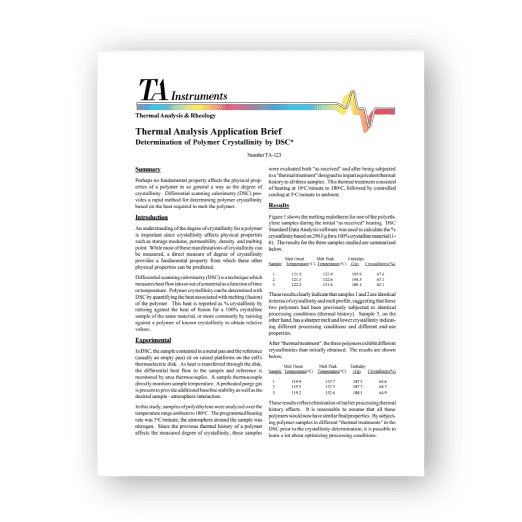Thermal Analysis Application Brief Determination of Polymer Crystallinity by DSC
Click below to download this Application Note

Summary
Perhaps no fundamental property affects the physical properties of a polymer in so general a way as the degree of crystallinity. Differential scanning calorimetry (DSC) provides a rapid method for determining polymer crystallinity based on the heat required to melt the polymer.
Introduction
An understanding of the degree of crystallinity for a polymer is important since crystallinity affects physical properties such as storage modulus, permeability, density, and melting point. While most of these manifestations of crystallinity can be measured, a direct measure of degree of crystallinity provides a fundamental property from which these other physical properties can be predicted. Differential scanning calorimetry (DSC) is a technique which measures heat flow into or out of a material as a function of time or temperature. Polymer crystallinity can be determined with DSC by quantifying the heat associated with melting (fusion) of the polymer. This heat is reported as % crystallinity by ratioing against the heat of fusion for a 100% crystalline sample of the same material, or more commonly by ratioing against a polymer of known crystallinity to obtain relative values.

About Covalent Metrology
Covalent Metrology is a disruptive analytical services laboratory and platform based in Sunnyvale, California. Its mission is to help companies using advanced materials and nanoscale devices accelerate product development with deeper insights and better analytical data. Covalent offers comprehensive solutions and services that integrate state-of-the-art lab infrastructure, world-class experts in a wide array of analytical techniques, and modern data management and analysis.
Covalent now has over 500 customers in 30+ industries.
Learn more at: https://covalentmetrology.com
